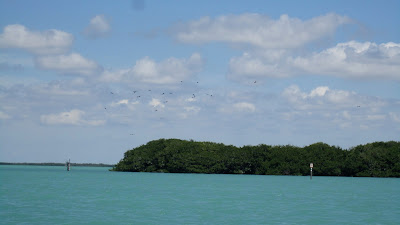Epiphanies in Ecology
For Long-Term Ecological Research (LTER) research in the
Seagrass Ecosystems Lab, we venture out into Florida Bay every two months to do
a survey of the submerged aquatic vegetation (seagrasses and macroalgae). As I mentioned in my last post (Florida Bay: Beneath the Surface) Florida Bay is
a honeycomb of basins, which creates different habitat types. These different habitats, specifically the
type and density of vegetation on the floor and sediment type (and many other
factors that are beyond the scope of this post), attribute to the color of the
water. In a single LTER trip, we see
water ranging from deep blue to teal, green, and even brown! After 2 years of running the LTER project
for our lab, I am still amazed by the dynamic nature of Florida Bay on the
surface and below.
 |
| Darker blue waters as we travel to Sprigger Bank. |
 |
| Milky teal waters of Duck Key. |
 |
| Duck Key on a different day. |
 |
| Little Madiera a week after TS Isaac passed through. Little Madiera is located near mainland Florida and receives a lot of freshwater input, especially after a major storm like Isaac. |




Comments
Post a Comment